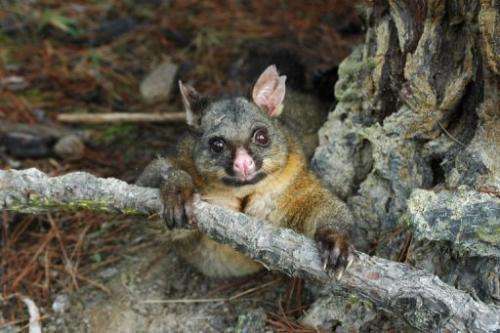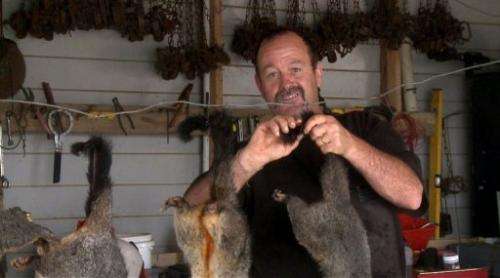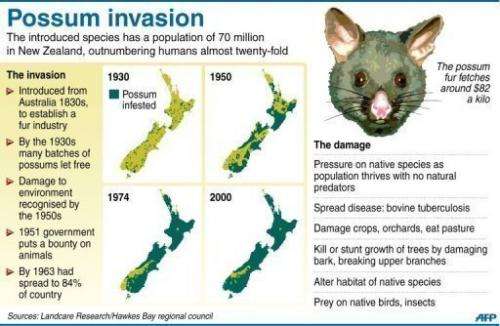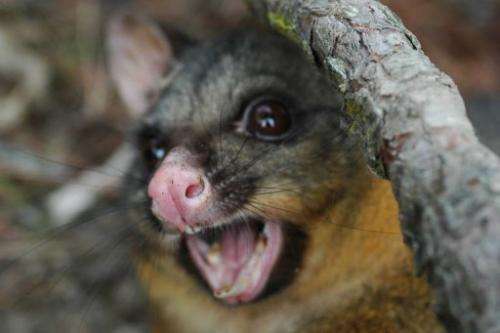A brushtail possum on New Zealand's North Island, in an undated photo released on April 17, 2012 by the Animal Health Board Inc. The possum, a cuddly-looking marsupial protected in its native Australia, has become a reviled feral pest in New Zealand, its fur providing a lucrative sideline for hunters who supply a burgeoning luxury goods industry.
The brushtail possum, a cuddly-looking marsupial protected in its native Australia, has become a reviled feral pest in New Zealand, its fur providing a lucrative sideline for hunters who supply a burgeoning luxury goods industry.
"It's a hard living and it's not for everyone," trapper Stu Flett says as he hangs possum carcasses from a clothes line at his home in the North Island to dry their fur before it is stripped and sold.
The possums, which have no natural predators in New Zealand, devastate native forest and eat the eggs of rare birds, including the iconic Kiwi, as well as spreading bovine tuberculosis to livestock.
The nocturnal marsupials were introduced in the 19th Century, quickly spreading out of control to the point where officials estimate there are now 70 million of them, outnumbering the human population almost twenty-fold.
"They're seen as a pest, people will swerve to hit them on the road," possum hunter Jake McLean said. "They tear up gardens, kill trees and destroy wildlife. They're vicious little animals really, when you get close to them."
Possum trapper Stu Flett hanging out possum carcasses to dry in his garage at his home in Matapouri on New Zealand's North Island, in an image from a video shot on April 2. The brushtail possum, a marsupial protected in its native Australia, has become a reviled feral pest in New Zealand, its fur providing a lucrative sideline for hunters who supply a burgeoning luxury goods industry.
A small but hardy group of trappers makes a living going into the bush to catch the animals, although most hunt them for weekend sport, earning "beer money" from the fur, which fetches around NZ$100 ($82) a kilogramme (2.2 pounds).
"The ones that take it seriously can earn NZ$40,000-50,000 a year," said McLean.
"They go and live in the bush, it's rough... they go into the ranges, where there are up to 10 possums per hectare.
"You're not living the good life when you're doing that, they're sleeping in tents or under flies (fly-sheets) on a river bed. Most do it for four or five years then look to buy themselves a house."
McLean was a full-time possum hunter until last year, contracted by the local council at Masterton, just outside Wellington, to go out for 10-day stints and eliminate the feral animals.
Graphic on the spread of brushtail possums throughout New Zealand. The brushtail possum, a cuddly-looking marsupial protected in its native Australia, has become a reviled feral pest in New Zealand, its fur providing a lucrative sideline for hunters who supply a burgeoning luxury goods industry.
However, the demanding work proved too much and he now works at a hunting shop in Masterton which buys the fur from trappers then sells it on to companies that turn it into luxury jumpers, scarves and gloves.
Dozens of such collection points operate throughout rural New Zealand, providing raw materials to an industry the New Zealand Fur Council estimates is worth NZ$100 million a year and employs 1,200 people.
Possum fur is highly prized because its fibres are hollow, similar to polar bears', and when blended with merino wool creates a super-soft fibre that is lightweight, with excellent insulation properties.
Greg Howard, whose company Planet Green makes golf gloves from possum hide, said the industry harvested only about two million possums a year and could increase dramatically if promoted properly in export markets.
He said the ethical objections often raised against the fur trade did not apply to possums culled in New Zealand because they are seen as a feral pest that causes enormous damage to the environment.
A brushtail possum on New Zealand's North Island, in an undated photo released on April 17, 2012 by the Animal Health Board Inc.. The possum, a cuddly-looking marsupial protected in its native Australia, has become a reviled feral pest in New Zealand, its fur providing a lucrative sideline for hunters who supply a burgeoning luxury goods industry.
"By doing this we're helping to save the planet," he said. "So the market's sitting there and the government just needs to get in behind us. It's all there on our back doorstep and no one's doing anything about it."
However, the New Zealand branch of conservation group the World Wildlife Fund (WWF) said that while it supported eradicating possums, it still had reservations about basing a fur industry around them.
"WWF doesn't support commercial trade in possum fur, as there is a possibility that companies that profit from the sale of possum fur have a financial interest in ensuring the survival of this pest species," it said in a statement.
McLean said hunters also wanted to see possums wiped out in New Zealand but believed they were so numerous they would continue to thrive for the foreseeable future, despite the best efforts of trappers and the government.
"I don't think they'll ever get rid of them, there's too many out there," he said.
(c) 2012 AFP

























